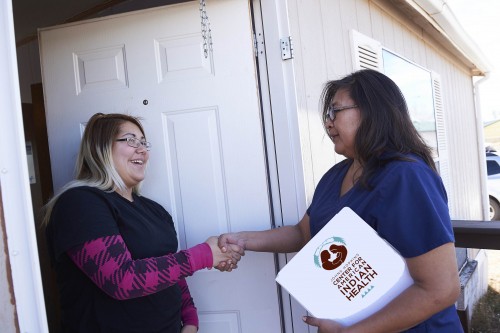
With a new award from the Bristol-Myers Squibb Foundation, the Johns Hopkins Center for American Indian Health is launching an initiative to address cancer, starting by understanding gaps in screening, diagnosis and treatment of breast, colorectal, and stomach cancers within the White Mountain Apache and Navajo communities. The project will employ intensive community engagement to design ways to improve the continuum of care for people suffering from breast, colorectal, and stomach cancer in southwestern Native American reservation communities, some of the most rural, isolated and underserved areas of the United States.
For Native American people, the intensifying confluence of historical and modern traumas affecting declines in behavioral and mental health have precipitated an upsurge in once negligible chronic disease rates, including obesity, diabetes, heart disease and, increasingly cancer. In fact, while cancer rates for other groups are decreasing, cancer rates are increasing for Native peoples. Native Americans today have the lowest cancer survival rate of any U.S. racial group. The initiative addresses the two of the most common cancers, breast and colorectal, for women and men, in addition to stomach cancers that affect Navajo people at higher rates.
Addressing inequities in screening and treatment
0320181843reduced.jpg)
Reservation clinics often lack on-site screening and treatment services, requiring patients to access services faraway at unfamiliar clinical centers. Lack of transportation and cultural differences present large barriers to getting needed screening and the best possible care. In the meantime, some cultural beliefs about cancer may amplify taboos and stigma that reduce screening and care-seeking behaviors, distancing those diagnosed with cancer from traditional family and community support networks that are typically a strong asset and source of resilience in tribal communities.
To overcome these barriers, this new initiative will work with the White Mountain Apache Tribe and the Chinle community, in the center of the Navajo Nation, to learn how to support patients’ screening needs; inform patients and their families about cancer screening opportunities, help them navigate available services, and improve the care and aftercare services they may receive. The initiative will mobilize integrated networks of local and regional stakeholders, cultural and technical experts to guide all aspects of the project.
Compassionate and culturally-informed engagement
Both participating sites have identified a need for culturally-informed education for patients and providers to improve communication and knowledge-sharing related to screening, diagnosing and treating cancers. Assisted transportation, greater outreach through mobile vans, and other strategies to improve screening will be an important target of this project. Another focal area will be facilitating connections to specialty care and coordinated case management between primary and specialty care physicians, promoting culturally appropriate patient and family education and education. Finally, overcoming stigma and taboos, as well as engaging cultural strengths as protective factors will elevate the project’s acceptance and success.
With culturally-appropriate community education, targeted screening and timely, high-quality treatment and case management, the initiative will work to reduce mortality and morbidity from cancer in Native populations. With support from the Bristol-Myers Squibb Foundation, the partnership will develop local and scalable solutions to affect change, with the goal to produce lessons and models that can help other Native American communities and underserved populations across the US.